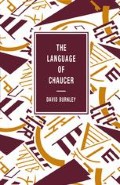Abstract
As we have seen in the previous chapter, Chaucer’s Host knew how to parrot the technical terms of medicine, how to utter the words urynals, jurdones, galiones, cardynacle, or triacle. He even seems to have known something of the meaning of some of them, yet he cannot use them competently. Indeed, he implicitly admits that his use of them may not make much sense, and offers as an explanation that ‘I kan nat speke in terme’. What exactly does he mean by this phrase?1 Chaucer does not use it elsewhere in precisely this form, but his use of the word termes in general suggests that he understood it to refer to words which were in some way distinct from the ordinary range of vocabulary used in everyday conversation. Termes may owe their distinctiveness to their obvious foreign origin, as with the phrases par consequens (D 2192) in the Summoner’s Tale, or questio quid iuris in his General Prologue description, which, we are told, the Summoner chattered as uncomprehendingly as a jay.2 Such Latin termes were also used by the Pardoner to quicken piety in his congregation, who were much impressed, if not informed, by this practice. The Summoner had learned his Latin tag, along with a few others whose meanings were unknown to him, from the formulaic phrasing of a decree; and it is characteristic of those phrases which Chaucer specifies as termes that he often makes reference to their source or proper field of use.
Preview
Unable to display preview. Download preview PDF.
Notes
See R. Blenner-Hassett, ‘Autobiographical Aspects of Chaucer’s Franklin’, Speculum, XXVIII (1953), 791–800
Marie Collins, ‘Love, Nature and Law in the Poetry of Gower and Chaucer’, in Glyn S. Burgess (ed.), Court and Poet (Liverpool: Francis Cairns, 1981) pp. 113–28.
F. Pollock and F.W. Maitland, The History of English Law, 2 vols, 2nd edn (Cambridge U.P., repr. 1968) pp. 651–3. More generally, see also R.B. Pugh, Imprisonment in the Middle Ages (Cambridge U.P., 1968).
G. Paré, Le Roman de la Rose et la Scolastique Courtoise (Paris and Ottawa, 1941) pp. 33–4.
J. Jolivet, Arts du langage et theologie chez Abelard (Paris: Vrin, 1969), p.278n. 178.
The technical nature of this discussion has recently been noted by Ian Bishop in Chaucer’s Troilus and Criseyde: A Critical Study (University of Bristol, 1981)pp. 53–4.
Martin Stevens, ‘“And Venus Laugheth”: An Interpretation of the Merchant’s Tale’, Chau. R, VII (1972) 118–31.
For the form of the vows in the contemporary marriage service, see Henry Littlehales (ed.), English Fragments from Latin Medieval Service Books, EETS ES 90 (London, 1903).
Further examples are given in J.D. Burnley, ‘The Morality of the Merchant’s Tale’, YES, VI (1976) 16–25.
F.J. Carmody, Li Livres dou Tresor of Brunetto Latini (Berkeley: California U.P., 1948): ‘ceste maniere de parler est mout bele et mout bonne et cortoise et de bon sentence, et mout le puet on trouver es dis de sages homes’, (p. 331).
Copyright information
© 1983 David Burnley
About this chapter
Cite this chapter
Burnley, D. (1983). Register and Propriety. In: The Language of Chaucer. The Language of Literature. Palgrave Macmillan, London. https://doi.org/10.1007/978-1-349-19997-6_9
Download citation
DOI: https://doi.org/10.1007/978-1-349-19997-6_9
Publisher Name: Palgrave Macmillan, London
Print ISBN: 978-0-333-49780-7
Online ISBN: 978-1-349-19997-6
eBook Packages: Palgrave Literature & Performing Arts CollectionLiterature, Cultural and Media Studies (R0)

